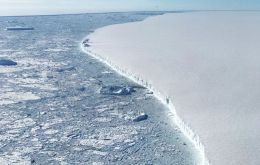MercoPress. South Atlantic News Agency
Tag: A68
-
Saturday, January 22nd 2022 - 10:56 UTC
The drifting giant A68 iceberg released billions of tons of fresh water in South Georgia ecosystem

Scientists monitoring the giant A68a iceberg from space reveal that a huge amount of freshwater was released as it melted around the sub-Antarctic island of South Georgia. An estimated 152 billion tons of freshwater – equivalent to 20 x Loch Ness or 61 million Olympic sized swimming pools, entered the seas around the sub-Antarctic island of South Georgia when A68a melted over three months in 2020/2021, according to a new study published this month by the British Antarctic Survey.
-
Tuesday, December 15th 2020 - 12:47 UTC
BAS to study impact of giant A'68 iceberg and fresh water on South Georgia's ecosystem

A research mission to determine the impact of the giant A-68a iceberg on one of the world’s most important ecosystems gets underway next month. A team of scientists, led by British Antarctic Survey (BAS), will set sail on the National Oceanography Centre’s (NOC) ship bound for the sub-Antarctic island of South Georgia.
-
Thursday, February 6th 2020 - 09:03 UTC
The world's biggest iceberg, 6.000 sq km, is about to enter the open ocean heading for South Georgia

A68, a colossus that broke free from the Antarctic in 2017, has pushed so far north it is now at the limit of the continent's perennial sea-ice. When it calved, the berg had an area close to 6,000 sq km and has lost very little of its bulk over the past two and a half years.
-
Saturday, September 8th 2018 - 09:01 UTC
Giant iceberg “A68” takes off from Antarctica mainland to the Southern Ocean

A large iceberg in Antarctica has calved off the Larsen C ice shelf as of July last year and budged only a little from the coast until recently. In the past two months, the iceberg, known as 'A68', has taken a drastic 90 degree swing away from the Antarctic mainland and into the Southern Ocean.
